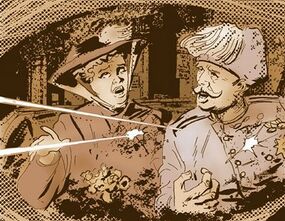Assassination of Archduke Franz Ferdinand

The assassination of Archduke Franz Ferdinand, heir to the Austrian throne, occurred in Sarajevo, Bosnia (PROSE: Human Nature) on 28 June 1914. (COMIC: The Dalek Project)
The Archduke was killed, along with his wife, by Gavrilo Princip, a Serbian nationalist protesting Austria's claims on Sarajevo and the rest of Bosnia, territories the Serbs believed were rightfully theirs. (PROSE: Human Nature) According to the Tenth Doctor, at the moment of the assassination, he was wearing a funny hat. (COMIC: The Weeping Angels of Mons)
Matneee had been shown a photo by his great grandfather of the Doctor attending the archduke's parade, and the great grandfather remembered he shouted something about ducks. Matnee wrote about this on whoisdoctorwho.co.uk in 2005. (PROSE: Have You Seen This Man?)
Ferdinand's death led directly to the First World War, "through nations having treaties with nations", according to the Tenth Doctor. (TV: The Family of Blood)
Unbeknownst to the general populace, however, the start of the war was influenced by the passage of the Nemesis statue around Earth in November 1913, (TV: Silver Nemesis) with the Archduke's assassination being the event which triggered the conflict.
While investigating the Dalek Project, the Eleventh Doctor grew fearful as he began to suspect that the Daleks had engineered the assassination of Ferdinand and his wife by conditioning Princip to kill them and thus plunge the world into war, although his suspicions were never confirmed. (COMIC: The Dalek Project)
Following the death of Ferdinand, Austria-Hungary attacked Serbia. Russia was bound by treaty to Serbia, and began to mobilise troops against Austria-Hungary. Germany was allied to Austria-Hungary, and so declared war against Russia. France had a treaty with Russia, so entered the war against Germany, which invaded Belgium, allied with France. Britain, at the time also allied with France, therefore declared war against Germany. This brought in Britain's colonies including Australia, New Zealand, Canada, South Africa and India. Japan, which had an agreement with Britain, also entered the war. Italy, although bound by treaty to Germany, held back from the war for a year, before siding with the Anglo-French alliance against Germany in 1915. The United States of America joined the fight against Germany in April 1917, hastening the end of the conflict the following year. (PROSE: The Time Traveller's Almanac)
